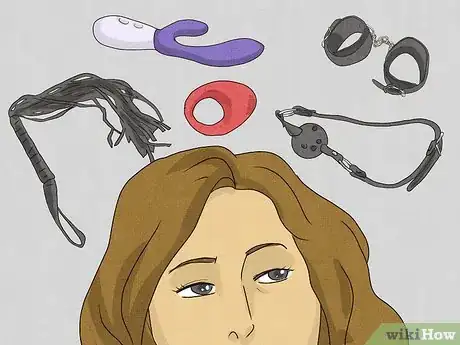This article was co-authored by Rebecca Tenzer, MAT, MA, LCSW, CCTP, CGCS, CCATP, CCFP and by wikiHow staff writer, Hannah Madden. Rebecca Tenzer is the owner and head clinician at Astute Counseling Services, a private counseling practice in Chicago, Illinois. With over 18 years of clinical and educational experience in the field of mental health, Rebecca specializes in the treatment of depression, anxiety, panic, trauma, grief, interpersonal relationships using a combination of Cognitive Behavioral therapy, Psychodynamic therapy, and other evidence-based practices. Rebecca holds a Bachelor of Arts (BA) in Sociology and Anthropology from DePauw University, a Master in Teaching (MAT) from Dominican University, and a Master of Social Work (MSW) from the University of Chicago. Rebecca has served as a member of the AmeriCorps and is also a Professor of Psychology at the collegiate level. Rebecca is trained as a Cognitive Behavioral Therapist (CBT), a Certified Clinical Trauma Professional (CCTP), a Certified Grief Counseling Specialist (CGCS), a Clinical Anxiety Treatment Professional (CCATP), and a Certified Compassion Fatigue Professional (CCFP). Rebecca is also a member of the Cognitive Behavioral Therapy Society of America and The National Association of Social Workers.
This article has been viewed 47,429 times.
Is the girl you’re dating obsessed with sex? Having a high libido is fine, but when it crosses over into a compulsion, it can really start to negatively affect your relationship. Fortunately, there are concrete red flags to watch out for to tell if the girl you’re seeing is a sex addict. Read through this article to learn more about sex addiction and how it might be impacting you.
Steps
She masturbates excessively.
-
Masturbating compulsively could be a sign of sex addiction. On its own, masturbating is a healthy behavior that isn’t concerning. However, if you notice that she is masturbating multiple times a day or right after you two have had sex, that’s a red flag.[1] X Trustworthy Source PubMed Central Journal archive from the U.S. National Institutes of Health Go to source
- She might also masturbate at inappropriate times, like when you have friends over or in public.
She has a large stash of pornography.
-
An excessive stash could indicate she’s thinking about sex often. While it’s typically fine to look at porn sometimes, you might notice that she has hours upon hours saved on her phone or computer.[2] X Expert Source

Clinical Therapist & Adjunct Professor Expert Interview. 19 August 2020. Using pornography to masturbate more often than usual means that she’s probably preoccupied with sex, which could mean she has an addiction.[3] X Trustworthy Source PubMed Central Journal archive from the U.S. National Institutes of Health Go to source- Pornography doesn’t have to be images or videos, it could also be erotic fiction.
- Keep in mind that watching pornography is completely normal behavior, as long as it's done in moderation.[4]
X
Expert Source

Clinical Therapist & Adjunct Professor Expert Interview. 19 August 2020. - Talk with her to make sure you both are on the same page when it comes to pornography and your relationship.[5]
X
Expert Source

Clinical Therapist & Adjunct Professor Expert Interview. 19 August 2020.
She’s secretive about her phone or computer.
-
Being secretive could mean she’s engaging in sexual acts online. People who are addicted to sex will often use the internet to watch porn, chat with strangers, or arrange hookups. If you notice that she’s jumpy or antsy when you ask to borrow her phone or computer, it could mean that she’s hiding her addiction from you.[6] X Research source
She cheats on her partners.
-
Sex addicts often seek out more than one partner. This is because they feel like they aren’t getting their needs met inside of the relationship, so they go elsewhere. Unfortunately, sex addicts also don’t care if their actions hurt others—they are only focused on getting their next fix.[7] X Trustworthy Source PubMed Central Journal archive from the U.S. National Institutes of Health Go to source
- If you’re dating a sex addict, you might also notice that she has no history of long-term relationships, probably because she finds it so hard to remain faithful.
She neglects other responsibilities for sex.
-
You might find her ditching work or her friends to stay home and masturbate. Or, she might be putting off school work so that she can satisfy her sexual urges. If there are things in her life that are falling by the wayside, that’s a sure sign that sex is taking over her life.[8] X Research source
- If you two are in a sexual relationship, she might try to urge you to put off your responsibilities to have sex with her.
She can’t stop thinking or talking about sex.
-
She might bring up sex at inappropriate times. Or, she might talk to you about sex even when you’ve said you aren’t in the mood. Talking about sex often might mean that she can’t stop thinking about it, and she wants to get it off her chest so that her thoughts stop bottling up.[9] X Research source
- She might even bring up sex in front of others, like your friends or family.
She promises to stop her behavior, but never can.
-
Sex addicts often go through a cycle of addiction. She might realize that her preoccupation with sex is harming her, so she promises to herself (and to you) that she’ll change. This might work for a little while, but eventually, she will most likely fall back into her obsessive ways.[10] X Research source
- Maybe you’ve talked to her about how often you two have sex, and you’ve expressed that her constant need for it makes you uncomfortable. She might be able to hold off for a few weeks (or days), but then she falls right back into pressuring you or coming onto you.
She constantly wants to try new things in the bedroom.
-
She may be using kinks to satisfy her sexual urges. There’s nothing wrong with trying new things in the bedroom, but you might notice that she constantly brings a new idea or fantasy up to try out with you. If she can’t be satisfied with your sex life, it most likely means that she has an addiction.[11] X Research source
- She might constantly try to bring rougher elements into sex as well.
She feels guilty or remorseful after having sex.
-
Feelings of shame often indicate an unhealthy relationship with sex. There’s nothing wrong with having sex, as long as both parties are consenting adults. However, you might notice that although she loves talking about sex and having it, she gets moody or sullen afterward.[12] X Trustworthy Source Mayo Clinic Educational website from one of the world's leading hospitals Go to source
- These feelings usually stem from being repressed or shamed for sexuality earlier in life. Try to encourage her to speak to a mental health professional to work through her emotions if you can.
She uses sex to cope with negative emotions.
-
Sex addicts often need sex to feel better. If you notice that every time she’s stressed or has a bad day she “needs” to have sex, that’s a red flag. Sex is stress-relieving for some people, but sex addicts use it as a way to cope, which only leads to problems in the long run.[13] X Trustworthy Source PubMed Central Journal archive from the U.S. National Institutes of Health Go to source
- Using sex as a coping mechanism pushes down the negative emotions instead of working through them.
She engages in risky sexual behavior.
-
People addicted to sex will put themselves and others at risk. She might meet up with strangers for sex or have sex with someone without protection. Sex addicts have trouble thinking rationally about sex, and they don’t care if they are doing dangerous things to feel good.[14] X Trustworthy Source Mayo Clinic Educational website from one of the world's leading hospitals Go to source
- If you are dating someone who has engaged in risky sexual behavior, make an appointment to get tested for STDs.
She needs treatment to get better.
-
Sex addiction can only be helped by a mental health professional. If you think that the girl you’re seeing is addicted to sex, have an open, honest conversation with her, and encourage her to seek help. She can work with a therapist to uncover why she’s addicted to sex and what other emotions she might be working to cover up.[15] X Trustworthy Source Mayo Clinic Educational website from one of the world's leading hospitals Go to source
- You could say something like, “I’ve noticed that you seem to be pretty obsessed with sex. I think that talking to a counselor could really help you, and you might feel happier.”
You Might Also Like
 How to Get Rid of a Porn Addiction
How to Get Rid of a Porn Addiction


 How to Cut Down on Masturbating to Porn: 13 Techniques
How to Cut Down on Masturbating to Porn: 13 Techniques


 Why Does My Boyfriend Watch Porn? 14 Things It Might Mean & How to Talk to Him About It
Why Does My Boyfriend Watch Porn? 14 Things It Might Mean & How to Talk to Him About It
 How to Stop Watching Porn + Signs of Addiction & Negative Impacts
How to Stop Watching Porn + Signs of Addiction & Negative Impacts
 How to Stop an Obsession with Someone or Something
How to Stop an Obsession with Someone or Something
 How to Stop an Addiction: Your Guide to Recovery
How to Stop an Addiction: Your Guide to Recovery




References
- ↑ https://www.ncbi.nlm.nih.gov/pmc/articles/PMC2945841/
- ↑ Rebecca Tenzer, MAT, MA, LCSW, CCTP, CGCS, CCATP, CCFP. Clinical Therapist & Adjunct Professor. Expert Interview. 19 August 2020.
- ↑ https://www.ncbi.nlm.nih.gov/pmc/articles/PMC2945841/
- ↑ Rebecca Tenzer, MAT, MA, LCSW, CCTP, CGCS, CCATP, CCFP. Clinical Therapist & Adjunct Professor. Expert Interview. 19 August 2020.
- ↑ Rebecca Tenzer, MAT, MA, LCSW, CCTP, CGCS, CCATP, CCFP. Clinical Therapist & Adjunct Professor. Expert Interview. 19 August 2020.
- ↑ https://www.relate.org.uk/blog/2014/7/15/understanding-sex-addiction
- ↑ https://www.ncbi.nlm.nih.gov/pmc/articles/PMC2945841/
- ↑ https://psychcentral.com/lib/symptoms-of-sexual-addiction#signs-and-symptoms
- ↑ https://www.psychologytoday.com/us/blog/what-the-wild-things-are/201011/unseen-and-unnoticed-women-and-sexual-compulsivity
- ↑ https://www.psychologytoday.com/us/blog/what-the-wild-things-are/201011/unseen-and-unnoticed-women-and-sexual-compulsivity
- ↑ https://psychcentral.com/lib/symptoms-of-sexual-addiction#signs-and-symptoms
- ↑ https://www.mayoclinic.org/diseases-conditions/compulsive-sexual-behavior/symptoms-causes/syc-20360434
- ↑ https://www.ncbi.nlm.nih.gov/pmc/articles/PMC2945841/
- ↑ https://www.mayoclinic.org/diseases-conditions/compulsive-sexual-behavior/symptoms-causes/syc-20360434
- ↑ https://www.mayoclinic.org/diseases-conditions/compulsive-sexual-behavior/symptoms-causes/syc-20360434
About This Article

























































